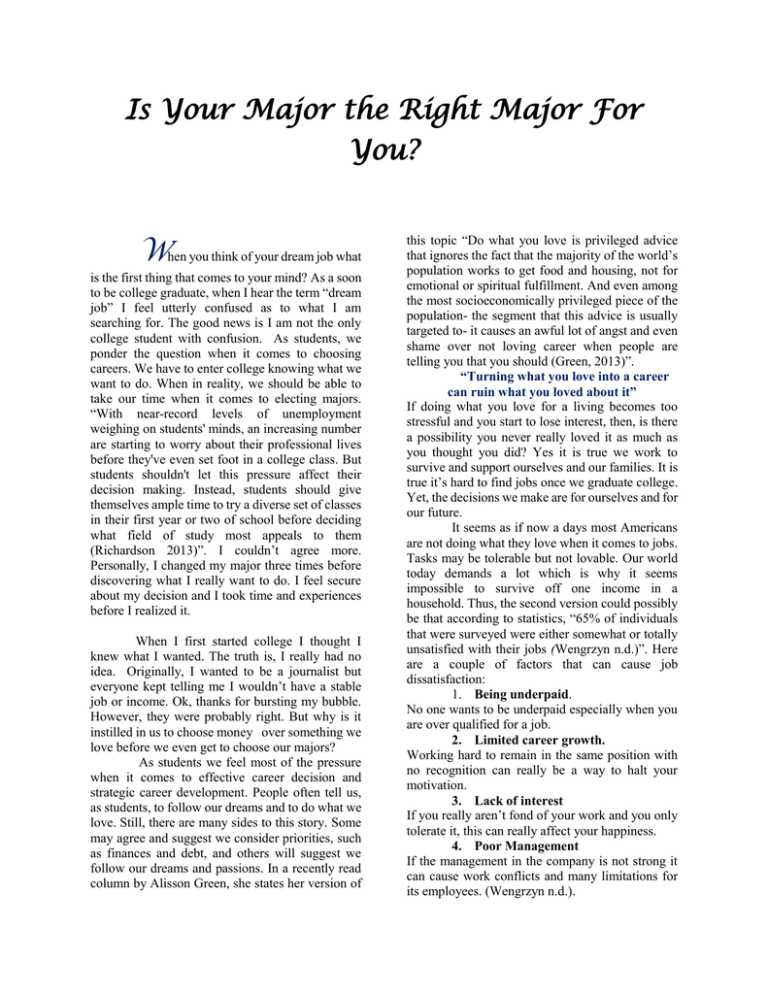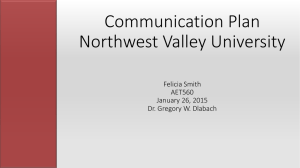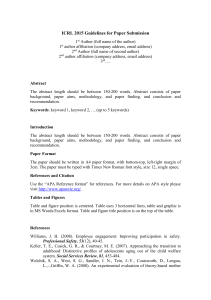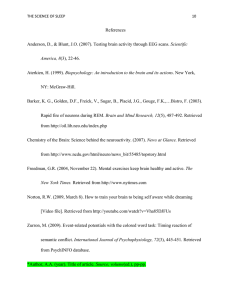Is Your Major the Right Major For You?
advertisement

Is Your Major the Right Major For You? When you think of your dream job what is the first thing that comes to your mind? As a soon to be college graduate, when I hear the term “dream job” I feel utterly confused as to what I am searching for. The good news is I am not the only college student with confusion. As students, we ponder the question when it comes to choosing careers. We have to enter college knowing what we want to do. When in reality, we should be able to take our time when it comes to electing majors. “With near-record levels of unemployment weighing on students' minds, an increasing number are starting to worry about their professional lives before they've even set foot in a college class. But students shouldn't let this pressure affect their decision making. Instead, students should give themselves ample time to try a diverse set of classes in their first year or two of school before deciding what field of study most appeals to them (Richardson 2013)”. I couldn’t agree more. Personally, I changed my major three times before discovering what I really want to do. I feel secure about my decision and I took time and experiences before I realized it. When I first started college I thought I knew what I wanted. The truth is, I really had no idea. Originally, I wanted to be a journalist but everyone kept telling me I wouldn’t have a stable job or income. Ok, thanks for bursting my bubble. However, they were probably right. But why is it instilled in us to choose money over something we love before we even get to choose our majors? As students we feel most of the pressure when it comes to effective career decision and strategic career development. People often tell us, as students, to follow our dreams and to do what we love. Still, there are many sides to this story. Some may agree and suggest we consider priorities, such as finances and debt, and others will suggest we follow our dreams and passions. In a recently read column by Alisson Green, she states her version of this topic “Do what you love is privileged advice that ignores the fact that the majority of the world’s population works to get food and housing, not for emotional or spiritual fulfillment. And even among the most socioeconomically privileged piece of the population- the segment that this advice is usually targeted to- it causes an awful lot of angst and even shame over not loving career when people are telling you that you should (Green, 2013)”. “Turning what you love into a career can ruin what you loved about it” If doing what you love for a living becomes too stressful and you start to lose interest, then, is there a possibility you never really loved it as much as you thought you did? Yes it is true we work to survive and support ourselves and our families. It is true it’s hard to find jobs once we graduate college. Yet, the decisions we make are for ourselves and for our future. It seems as if now a days most Americans are not doing what they love when it comes to jobs. Tasks may be tolerable but not lovable. Our world today demands a lot which is why it seems impossible to survive off one income in a household. Thus, the second version could possibly be that according to statistics, “65% of individuals that were surveyed were either somewhat or totally unsatisfied with their jobs (Wengrzyn n.d.)”. Here are a couple of factors that can cause job dissatisfaction: 1. Being underpaid. No one wants to be underpaid especially when you are over qualified for a job. 2. Limited career growth. Working hard to remain in the same position with no recognition can really be a way to halt your motivation. 3. Lack of interest If you really aren’t fond of your work and you only tolerate it, this can really affect your happiness. 4. Poor Management If the management in the company is not strong it can cause work conflicts and many limitations for its employees. (Wengrzyn n.d.). likely change as we advance in college. Having high expectations of life or jobs can lead to dissatisfaction or disappointment. Our education makes us powerful, not arrogant. There are numerous ways you can help yourself explore what you want to do. For example, here at California State University, Los Angeles the career center offers personality and interest’s tests that can give you an idea of where your interests really are and can motivate you to explore little more. Also, you can always set up meetings with the career center advisors for a one on one to help guide you. It’s a great way to start pin pointing the things we truly enjoy doing and the people we want to be around. Of course, money is a big necessity and a big factor when we make life decisions. However, there is always a possibility to try and achieve both. Ultimately, the choice is in the eye of the beholder. Everyone has a different perspective when it comes to job satisfaction and career decision making. As Daniel H. Pink, author of “Drive: The Surprising Truth About What Motivates Us” said, “In the end, people should pursue what they’re interested in. Looking at lists of careers with the highest salaries tends to be a fool’s game”. An article I found online had several great tips on how to choose the most fit college major for yourself. Here are some tips: 1. Wait until college 2. But don’t wait too long 3. Curiosity won’t kill you 4. Make Sure it’s your passion 5. Beware of the exceptions and rules (Burnsed, 2011). Although everyone has a different point of view, it is completely fine to take risks. Especially as college students because what we experience during these four or five years at a university is what will be most useful to us when making decisions. Expectations that we might have had at the beginning of our college journey can and will most Nevertheless, it is highly important you know how to look beyond your comfort zone and expand your horizon. It is crucial you know how to identify your weaknesses and expand your skills. Because in the end, these are the qualities that will help you position yourself in an environment that will allow you to succeed and grow. Advocate yourself as a confident individual and strut your stuff. Your maximum potential is completely within your reach through the right amount of selfexploration and awareness. College can be tough, and choosing a career can be even more stressful. Job dissatisfaction does not have to be inevitable. Using resources available to you can be very beneficial to you and can ensure you are content with the decisions you make for your career and future life expectations. Take your time; your future is not a race. “Spend some time defining your true life goals and then start looking at what you need to do to get there. You’ll soon find out that much of your life is just a distraction from that goal or a stepping stone to help you reach it. Toss out the distractions and look for more stepping stones (Hamm, 2014)”. Claudia Martinez is a fourth year student at CalState Los Angeles. She is a Business Administration major Opt. in Human Resource Management. Originally from San Diego, Claudia plans to move back home after graduation and find a job in the hospitality industry. Works Cited Blackmoon. O. (2013, December 5). Just the Stats: Majority of College-Bound Students Select Wrong Majors. Diverse. Retrieved from http://diverseeducation.com/article/57695/ Burnsed. B. (2011, September 19). 5 Ways to Pick the Right College Major. U.S. News. Retrieved from http://www.usnews.com/education/best-colleges/articles/2011/09/19/5-ways-to-pick-theright-college-major Green. A. (2013, April 17). Why You Shouldn’t Follow Your Passion. U.S. News. Retrieved from http://money.usnews.com/money/blogs/outside-voices careers/2013/04/17/why-you-shouldntfollow-your-passion Hamm. T. (2014, September, 22). Money versus Job Satisfaction. The Simple Dollar. Retrieved from http://www.thesimpledollar.com/the-big-battle-money-versus-job-satisfaction/ Korkki, P. (2010, September 11). Job Satisfaction vs. a Big Paycheck. The New York Times. Retrieved from http://www.nytimes.com/2010/09/12/jobs/12search.html?_r=1& Simon. C. (2012, November 2). Major Decisions. The New York Times. Retrieved from http://www.nytimes.com/2012/11/04/education/edlife/choosing-one-college-major-out-ofhundreds.html?_r=0 Wengrzyn. R. (n.d.), Job Dissatisfaction: Causes, Reasons, and Employee Responses. Education Portal. Retrieved from http://education-portal.com/academy/lesson/job-dissatisfaction-causesreasons-and-employee-responses.html



